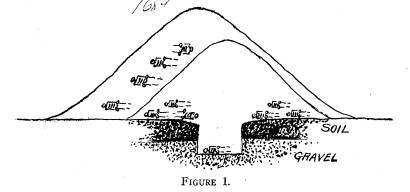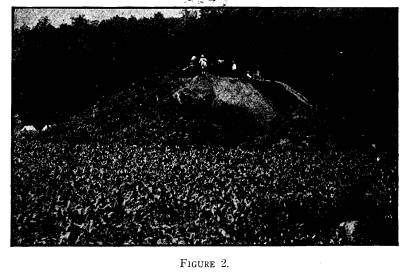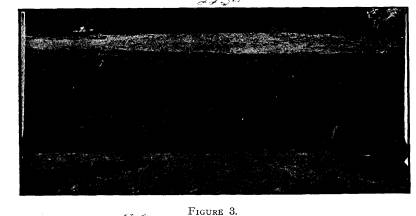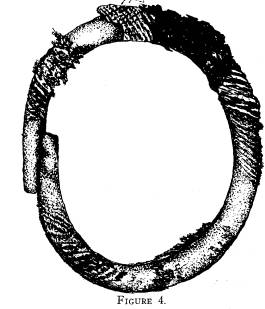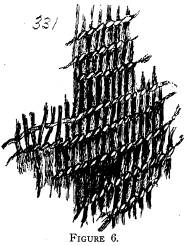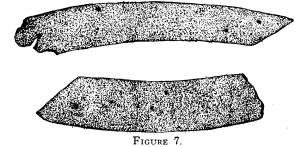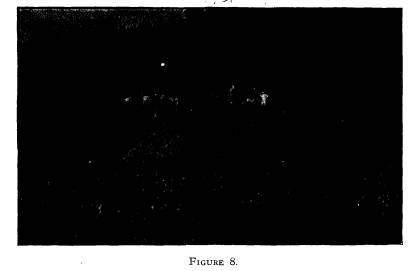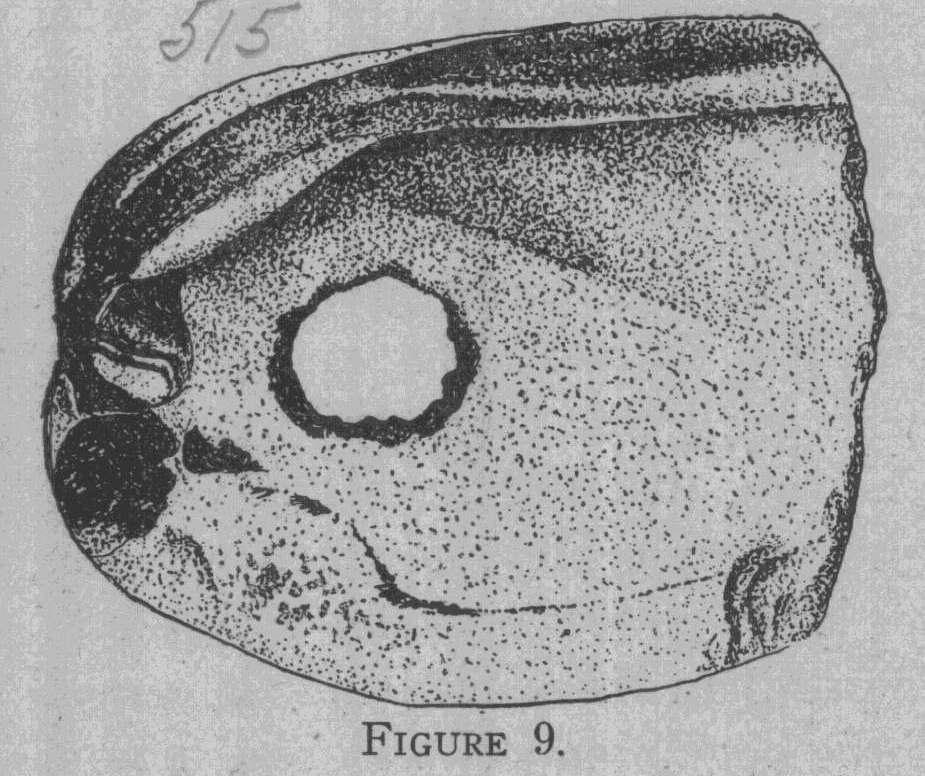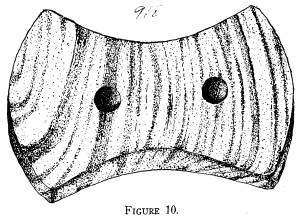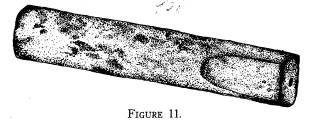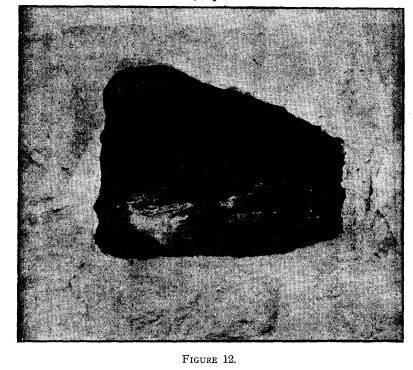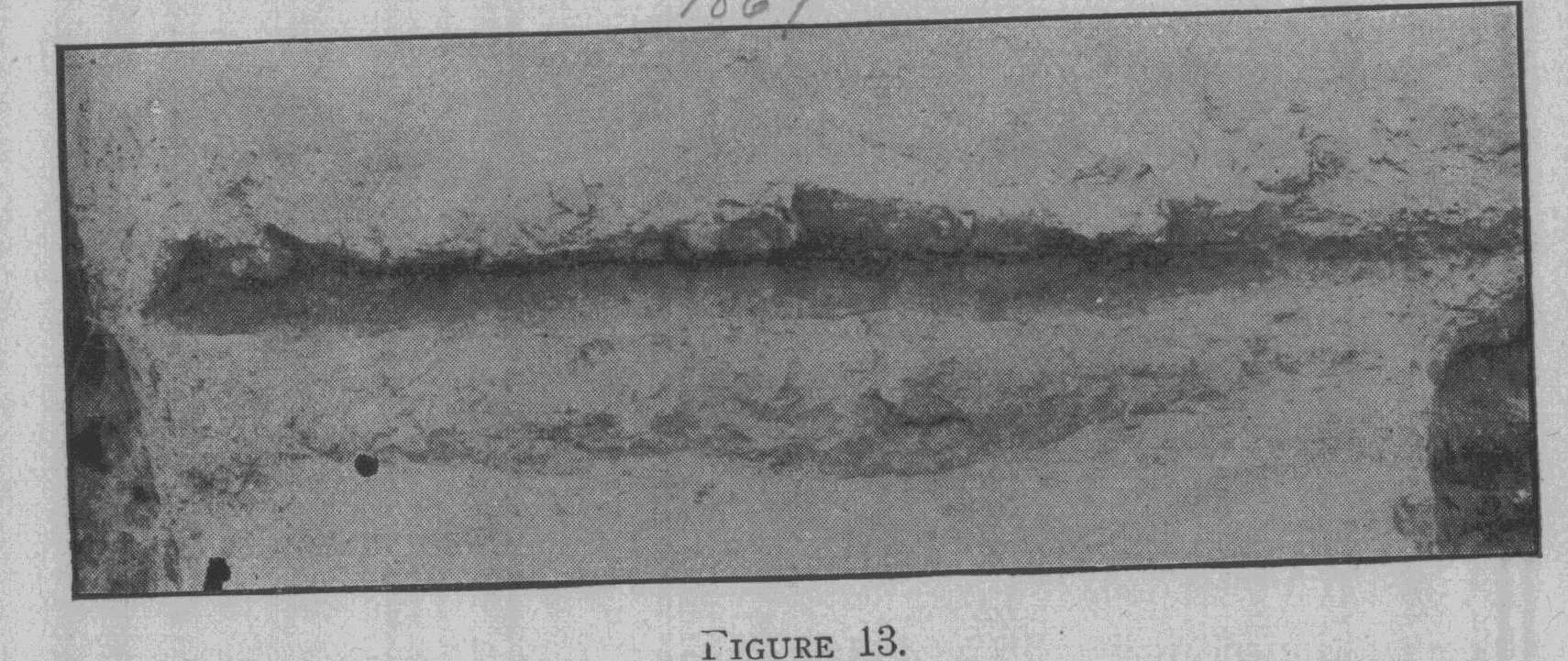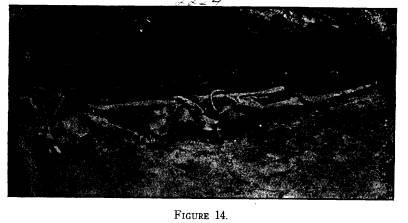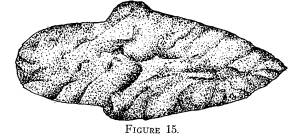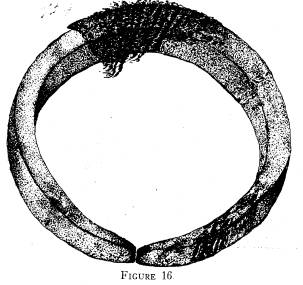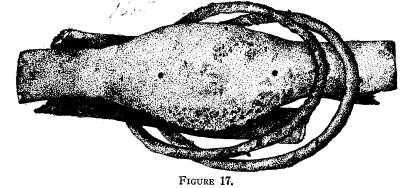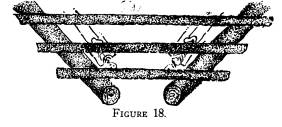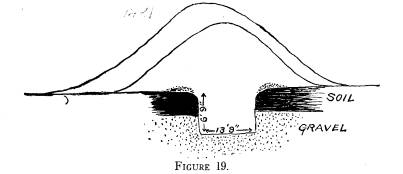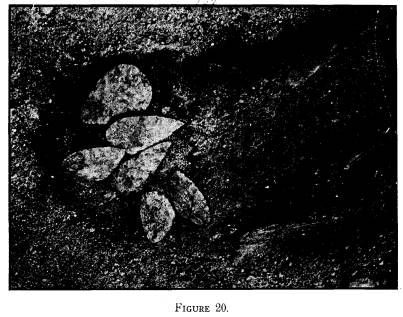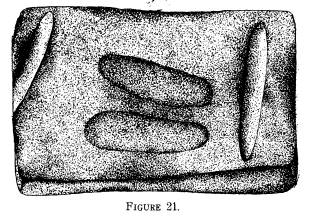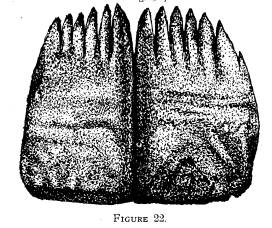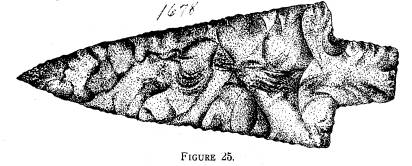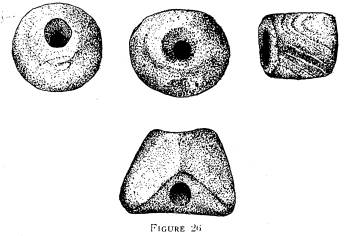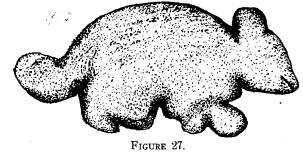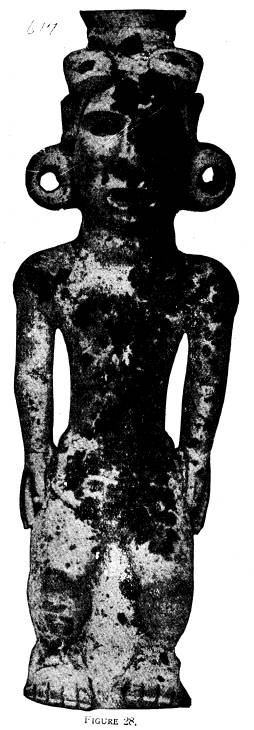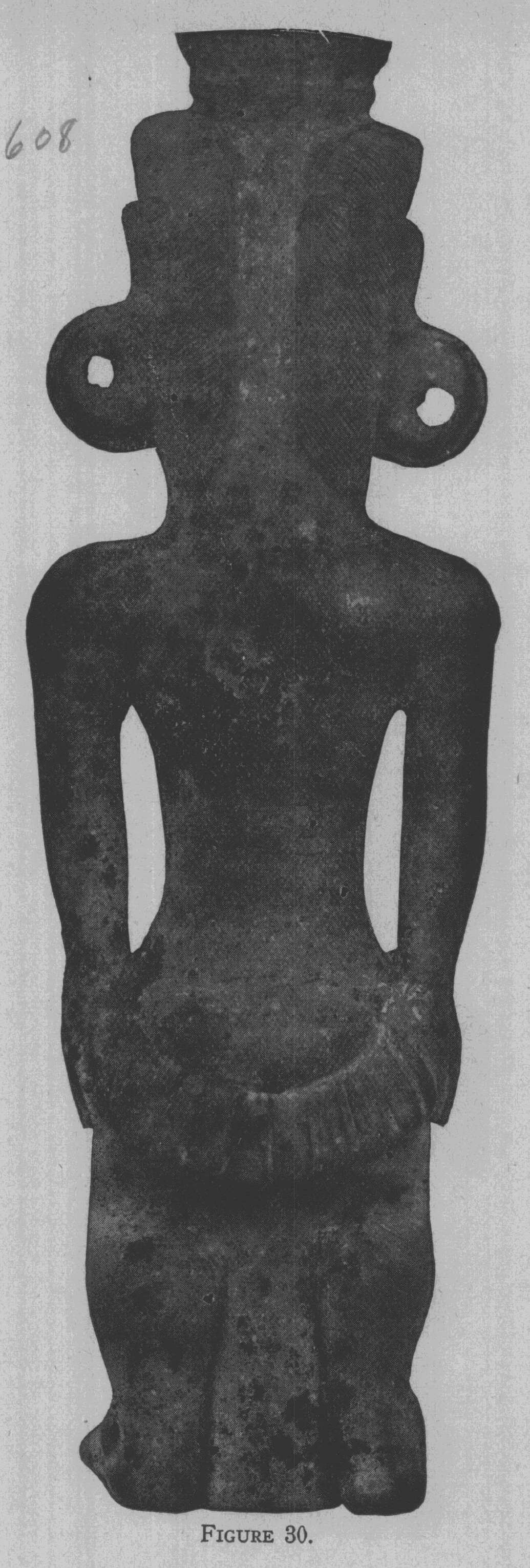Ohio History Journal
- 1
- 2
- 3
- 4
- 5
- 6
- 7
- 8
- 9
- 10
- 11
- 12
- 13
- 14
- 15
- 16
- 17
- 18
- 19
- 20
- 21
- 22
- 23
- 24
- 25
- 26
- 27
- 28
452 Ohio
Arch. and His. Society Publications.
EXCAVATIONS OF THE ADENA MOUND.
BY WILLIAM C. MILLS, B. SC.
(Curator Ohio State Archaeological
and Historical Society.)
The Adena mound, so named by Governor
Worthington, and
owned by his estate until a few years
ago, was thoroughly exam-
ined by the Ohio State Archaeological
and Historical Society
under the direction of its curator
during the summer of 1901.
The mound is located 11/2 miles from the
northwestern part of
the city of Chillicothe, in the valley
of the Scioto River. Stand-
ing upon the summit of this mound one
could see, looking di-
rectly to the north, the noted Mound
City so named by Squier
and Davis, and examined by them in 1846;
looking to the south
the Chillicothe group of mounds could be
seen, which were ex-
amined by Fowke, Moorehead and others;
directly to the east
could be seen the Scioto River, and to
the west is the large hill
upon which is located the mansion called
Adena, which was the
home of Governor Worthington. Near the
mound, and at the
foot of this hill, is Lake Ellensmere,
which played a very important
part in the construction of this mound.
In 1798, when Governor
Worthington came to Ohio, he purchased
the land upon which
this mound was located, and it has since
been owned by the heirs
until a few years ago, when it was sold
to Mr. Joseph Froehlich,
consequently the mound had been
preserved for more than 100
years. In the course of time the present
owner found that it
was quite an expense to keep this mound
in a good condition,
and as it occupied a large tract of fine
alluvial bottom land, which
was valuable for agricultural purposes,
he decided upon its com-
plete removal. On the 21st of June a
contract was entered into with
Mr. Froehlich to remove this mound, the
greater part of the soil
of which it was composed to be placed in
a cut made by the B. &
O. Railroad, which is perhaps fifty
yards away. The mound, at
the time work began, was 26 feet high
measuring from the south
side, 26 feet 9 inches measuring from
the north side, with a cir-
|
Excavations of the Adena Mound. 453
cumference of 445 feet. The north side of the mound was cov- ered with an undergrowth of small trees and briars, making it almost impossible of ascent, while on the south side the mound was not so densely covered and a path was easily made to the top of the mound, where the work began. Until last year the mound was covered with a growth of trees each ranging in diame- ter from 6 to 18 inches, but these had been cut down and taken away by Mr. Froehlich, preliminary to the removal of the mound. The outer surface of the mound was covered with a leaf mould from 3 to 7 inches in thickness. As work progressed upon the mound it was discovered that it had been built at two different periods. The first period represented the original mound which |
|
|
|
was 20 feet high with a base diameter of 90 feet being composed almost entirely of dark sand, which was no doubt taken from the small lake near by, known as Lake Ellensmere. The second period shows the enlargement of the original mound on all sides. On the south side the mound was only covered with a few feet of soil, while on the north side the base was extended more than 50 feet; this enlargement was carried up the side of the mound changing the apex between 12 and 15 feet. This is shown in Fig. 1. The soil of the second period differed very much from that of the first; while the first was composed almost entirely of sand and was of a dark color; the second part of the mound was composed of sand of a lighter color mixed with the soil of tile |
454 Ohio Arch. and His. Society Publications.
surrounding surface. In some places the
sand was entirely ab-
sent, while in others but very little
soil was mixed with it.
The mode of burial in the first period
was far different from
that in the second. In the original
mound no burials were found
until within five feet of the base line.
The body at the time of
its interment was enveloped in bark or a
coarse woven fabric
and then enclosed in a rude sepulcher
made of timbers, ranging
in diameter from 3 to 17 inches. The
sepulchers varied greatly
in size; those above the base line were
made by placing large
logs on each side of the body with a
covering of small logs
placed over the top. The sepulchers
placed on the base line were
usually made of a framework of timber,
which had long since
decayed away but the cast of which was
still retained in the hard
sand; this enclosure of timber, measured
from outside to outside,
was usually from 8 to 9 feet in length
and from 5 to 7 feet wide
and from 18 inches to 21/2 feet
high. They were constructed from
unhewn logs lain one upon another, and
were then covered over
the top with logs that were smaller than
those at the sides and
ends. After a period of time these logs
would decay, and the
superincumbent earth would drop into the
grave; with the sides
and ends supported and no support in the
center this would natu-
rally form an archway of earth, which
was clearly defined at the
time the mound was opened. In a number
of instances the loose
earth was removed from the sepulchers
disclosing large rooms,
some of which were 10 feet long and
seven feet wide, with an
arched roof, being high enough for a man
to stand upright in
them. In the second period the burials
were much different, no
sepulchers were prepared for the dead
and not one of the skele-
tons was covered with bark, and only one
showed any trace of a
woven fabric, this being preserved
around a copper bracelet.
The skeletons in the first period were
much better preserved
than those in the second; this was
caused by the protection af-
forded the body, at the time of burial,
by the sepulcher.
In the outer mound skeletons were found
from the top to
almost the bottom, while in the original
mound the skeletons
were all found within five feet of the
base line and below this
line. However the implements and
ornaments found in both sec-
Excavations of the Adena Mound. 455
tions of the mound were similar in every
respect, but were more
abundant in the first period than in the
second. In the first period
implements and ornaments were found with
all the sepulcher
burials, with but one exception, which
will be noted later. In
the second period quite a number of
skeletons were found that
had no implements or ornaments of any
kind placed with them.
The mound was removed in five-foot
sections commencing
at the top. In the first section, which
includes the apex of the
mound, we expected to find intrusive
burials, but in this we were
disappointed. The earth was carted to
the north side of the
mound in wheel barrows and thrown down
its sides. In the
second cut a winding road was made up
the side of the mound,
so that teams could remove the dirt,
which was done by the use
of wheel scrapers. The soil was loosened
with picks, and the
earth carefully examined, it was then
shoveled back so wheel
scrapers could carry the dirt away.
Whenever a grave was dis-
covered competent men were placed at
work to remove the dirt
from around it with small hand trowels.
All the skeletons were
photographed in place with the
implements and ornaments found
with them. All changes in the structure
of the mound were also
photographed. A total of 33 skeletons
was removed from the
mound, 21 occurring in the first period,
or the original mound,
and 12 in the second.period.
The first five feet of the apex of the
mound was composed
of soil taken from the surface
surrounding the mound. The soil
was first loosened by picks and then
loaded upon wheelbarrows
and carted to the north edge of the
mound where it was thrown
down the side. This section was
carefully examined for intrusive
burials but none were found. Five feet
from the edge, and al-
most on the base line of the cut, was
found a chipped hoe, 5 inches
in length and 13/4 inches in width,
which had evidently been lost
by the builders of the mound, as nothing
was found near it to
indicate that it had been placed there
intentionally. Near the
center of this section was found a small
quantity of charcoal scat-
tered through the soil which had
evidently been intermingled
with the earth at the time of its
deposit there. A little past the
center to the south side was again found
small particles of char-
|
456 Ohio Arch. and His. Society Publications.
coal, in this case a little pocket of ashes accompanied the char- coal, and it looked very much as though a small basket of earth, charcoal and ashes had been deposited together. East of the cen- ter of the mound, and near the base line of this cut, was found a very large pitted sandstone, pits occurring on both sides. The stone was 8 inches long, 6 inches wide and 5 inches thick. This sandstone was no doubt procured from the hillside near by, as ledges of this rock are exposed in several places. See Fig. 2 which shows first cut of 5 feet. |
|
|
|
The second cut of five feet which was commenced at the north side and carried through directly to the south, was far more interesting than the first cut. This cut was composed al- most entirely of earth and sand taken from the surrounding sur- face, with the exception of the center, which was composed of a compact dark colored sand, and so hard that it was necessary to pick it down before it could be removed. Fig. 3 shows a photo- graph of the dome-shaped sand which proved to be the top of the original mound. Near the center of this sand portion were found two frag- ments of human bones consisting of one small piece of the right |
|
Excavations of the Adena Mound. 457
femur and one small piece of the left humerus. A little past the center of this sand portion was found a pocket of ashes and char- |
|
|
|
|
coal; in these ashes parts of the meta carpal bone of the Jeer and part of the humerus of the wild turkey were found. Just outside of this sand center to the east, and about four feet from the top of the five-foot cut, was found the skeleton of an adult, upon the right arm of which two copper bracelets were found. These bracelets were made from a rounded piece of copper tapering to almost a point at each |
|
end, the ends overlapping each other when bent around the wrist. Around the bracelet was a quantity of well preserved woven cloth. |
|
458 Ohio Arch. and His. Society Publications.
Figure 4.-Upon a finger of the left hand were found two copper rings, and these were also made of hammered copper, formed into a light copper wire, this wire was then bent twice around the finger and formed what is known as the spiral ring. Figure 5.- |
|
|
|
The skeleton was very much decomposed and but very few of the bones could be saved. Around one of the bracelets was found a quantity of woven cloth; this cloth was very nicely preserved, showing the texture, etc. Figure 6.-Five feet to the east of this first skeleton was discovered the skeleton of an ado- |
|
lesent, upon the wrist of which were found two beautiful copper |
|
bracelets, similar in every respect to those found upon the first skeleton, and having upon the head a head-dress made of large strips of mica cut into shape and pierced with holes for attach- ment. Figure 7.-Near the head of this skeleton was found a broken earthen jar which was carefully removed. Near this jar was unearthed a large square block of sandstone with cup- shaped depressions on one side. Figure 8 shows the second cut and the dome of the original mound. |
|
|
|
The third cut of five feet brought to light one skeleton. This was found near the east side, 12 feet from the edge of the mound and |
|
only one foot below the bottom of the second cut. No im- plements or ornaments of any sort were placed with this skeleton. |
|
Excavations of the Adena Mound. 459
It was in a bad state of preservation and only small portions of it could be removed. Near the center of this section were a num- ber of deer bones which had evidently been carried there with the |
|
|
|
sand. A number of shell hoes made of the fresh water mussel (Unio plicatus), were scattered through the central portion of the mound. These shell hoes were made by cutting a hole |
|
|
through the shell for at- tachment. Figure 9.- The fourth cut of five feet was very interesting. Five skeletons were re- moved from this section. Fifteen feet from the north side, and almost upon the base line, two skeletons were found lying side by side; both were adults, the one being a male and the |
|
other a female. No implements or ornaments were placed with these skeletons but both were in a very bad state of decay. |
460
Ohio Arch. and His. Society Publications.
but the arm and leg bones were removed
in a very good condition.
A little farther in from the north edge
was found another skele-
ton, upon the wrist of which were two
copper bracelets; these
were quite small, in fact they had been
hammered down so that
the wire of which they were made was
less than 1/4 inch in diame-
ter; they were bent around the wrist,
the ends overlapping each
other, very similar to those found in
the second cut; no other
implements or ornaments were found with
this skeleton. On
the east side, and 21/2 feet from the
base of this cut, was found
the skeleton of an adult; it was lying
at full length, head to the
north; around the loins there was a
coarsely woven cloth, but
very little of this cloth was saved
owing to the advanced stage of
decomposition. No implements or
ornaments of any sort were
found with this skeleton. Not far from
the south side of this
cut was found the fifth skeleton; this
was very near the edge of
the mound and might have been an
intrusive or secondary burial.
The skeleton was in a fair state of
preservation, and the skull
and bones were carefully removed. No
implements or orna-
ments of any kind were found with this
skeleton.
The mound had now been removed to within
six feet of the
base. Heretofore we had commenced each
five-foot cut upon
the north side of the mound; this was
done to aid the teamsters
in removing the earth to the railroad
cut. Of the last six feet
only two were removed, leaving the mound
about four feet high
when the work was finished. The object
was twofold; first, the
expense of removal of the last four
feet; second, the owner
wished to have left a part of the mound
to show at least where
it stood; yet all of the dirt comprising
the last six feet was care-
fully examined.
The work of examining the last cut was
begun on the east
side of the mound. Commencing at the
very edge and following
the base line it was soon discovered
that this line gradually
dropped toward the center, showing that
the earth had been re-
moved forming a hollow basin, in the
center of which was dug
a large grave, 13 feet 9 inches long, 11
feet 4 inches wide, and 6
feet 9 inches deep, digging more than
three feet into the gravel
below, showing that this was the
beginning of this great mound.
The first skeleton found in this cut was
that of an adult, found
|
Excavations of the Adena Mound. 461
within the original mound. This skeleton was placed in a sepul- cher made of logs; further examination of this sepulcher dis- closed the fact that it contained another burial, the two burials being parallel, but the skeletons being in reversed positions; both were covered with bark, but no traces of cloth were dis- |
|
|
|
cernable. These skeletons were the largest so far found, the first one measuring 5 feet 11 inches, the second 5 feet 103/4 inches in. length. On the right wrist of skeleton number one was found a slate gorget. Figure 10.-Directly between the two skeletons was found a tube pipe. Figure 11.-The pipe is made of clay, presum- |
|
|
|
ably fire clay. The whole is ½ inch in diameter, tapering to a point where it is only 1/8 inch. The pipe is 4 inches in length and 7/8 inch in diameter. This sepulcher was constructed of un- hewn timbers varying in length from 8 to 9 feet, and in diameter from 6 to 12 inches, although in several graves very much larger |
|
462 Ohio Arch. and His. Society Publications. logs were found. These timbers were laid one upon another to a height of 21/2 feet, other timbers were then laid over the top and the dirt piled over all; in time these timbers rotted away and the superincumbent earth above would drop into the grave, and as the sides and ends were supported, naturally the center of the grave would drop in first; this finally formed an archway of |
|
|
|
earth above. Figure 12. The cast of one of the timbers form- ing the rude sepulcher is shown in Figure 13. Skeleton number three was found on the north side of the cut, near the base line. It was very much decomposed. The only ornament found with this skeleton was a bracelet made of bone beads. The skeleton was that of an adult male. Skeleton number four was only a few feet from number three, but had a sepulcher made for it; some of the logs which |
|
Excavations of the Adena Mound. 463
composed this sepulcher were 10 inches in diameter. The body had evidently been previously buried in some other place and later transferred to this mound, as the skull was placed in the center of the grave with the foramen magnum turned upward, |
|
|
|
and surrounding it were bones of the leg, arm, and vertebrae. At one end were the cervical vertebrae and bones of the hand and foot; at the other end were the ribs and bones of the arm and lower legs. Throughout the mass upward of 200 beads made of |
|
|
|
bone and shell were found. The covering over the top of this burial consisted of three layers of bark the outside layer being very heavy something like oak bark; the next layer was of a thinner bark something like the elm, the inside layer being a very |
|
464 Ohio Arch. and His. Society Publications.
thin bark very much like the wild cherry or birch. Figure 14 shows a photograph of this skeleton as it was uncovered in the mound. |
|
|
|
Skeleton number five was found on the south side of the mound lying at full length, head to the east and 41/2 feet from the base of the mound. This skeleton was 5 feet 81/2 inches in length, and was that of an adult male. Near the head was a spearhead |
|
|
|
of chalcedony 4 inches in length; this spear is shown in Figure 15. Two very large flat bracelets, made of copper, were found on the right arm; these were partly covered with cloth which was very nicely preserved by the carbonate of copper. Figure 16 |
|
Excavations of the Adena Mound. 465 shows the copper bracelets. About three feet nearer the center of the mound, and on the same level with number five, was ex- humed skeleton number six, which was 5 feet 7½ inches in length, and was that of an adult female. On the right arm were found two bracelets made of copper; these bracelets encircled a boat- shaped ornament pierced with two holes; through these holes were strings which had been preserved by the action of the cop- per; these strings showed, too, that the gorget had been attached either to the arm or to a woven fabric that was found associated with the bracelets. This boat-shaped gorget is 53/4 inches in length and made of limestone; see Figure 17, which shows the position in which the gorget and bracelets were found. Skeleton number |
|
|
|
seven was found not far from number six, but nearer to the center of the mound; it was that of an adult. The skeleton was placed about 41/2 feet from the base of the mound. No ornaments of any sort had been buried with it and it was without even having a covering of bark. The skeleton was in a very bad state of pres- ervation, and only a very small portion of it could be removed. Skeleton number eight was that of a child about six years of age. The skeleton was placed in a sepulcher made of unhewn logs, and was 8 feet 9 inches in length, 5 feet 8 inches in width and 2 feet 9 inches high, and was placed on the base of the mound. The bottom of the sepulcher was covered with a bed of fine gravel firmly packed. This gravel, at the south end of the sepulcher, was three inches thick and at the north end 2 inches; over the Vol. X--30 |
|
466 Ohio Arch. and His. Society Publications. top of this gravel was placed a layer of bark; this bark seemed to completely cover the bottom of the grave. The body of the child had evidently been wrapped in cloth from head to foot; over this cloth was also a wrapping of birch bark, and then came long strips of wood which were about one-half inch thick and 2 inches wide; these were placed entirely around the skeleton, and over all was another covering of bark which looked very much like the inner bark of the bass wood. Around the neck of the little child two strings of beads were found. The first string consisted of about fifty beads made of bone and shell from one- fourth to one-half inch in diameter; the other string was very much larger, and contained about 150 beads made of both shell and bone. The cloth found around the skeleton was of two kinds; the greater part consisted of a coarsely woven mat resembling very much the burlap of our present time; the other, which was |
|
|
|
placed around the loins, was made of stronger and heavier ma terial and was not so closely woven. Skeletons number nine and ten were found on the south side of the mound and were placed together in a sepulcher made of logs which differed somewhat from the other sepulchers so far discovered; see Figure 18. The sides of this sepulcher were composed of large logs 15 and 16 inches respectively in diameter. These logs were placed near together at the head and extended at an angle of 35° as shown in the drawing. The logs placed over the top as a protection to the body when placed in the grave were quite large, none of them being less than 6 inches in diame- ter, and the largest one 12 inches. The skeletons were those of adults, both being males, and were in a good state of preserva- tion; around the neck of one six beads were found; these were about one-half inch in diameter and made of bone finely polished. |
Excavations of the Adena Mound. 467
No implements or other ornaments were
placed in the sepulcher.
Skeleton number eleven was that of an
adult male also placed
in a sepulcher made of logs, and
was 8 feet long 4 feet wide and
18 inches high; the skeleton was 5 feet
7 inches in length.
Around the neck was a necklace made of
bone beads.
Directly beneath this sepulcher and on
the base line of the
mound was a great fireplace, the ashes
being 14 inches in thick-
ness; this was very near to the grave
which was found in the
center of the mound. In these ashes was
found a great quantity
of burned mussel shells, also the bones
of various animals; these
were all calcined by the heat but enough
was left to identify them;
those removed from the ashes were the
wild turkey, trumpeter
swan, Virginia deer, black bear and
raccoon; not a particle of
charcoal was found in this fireplace,
showing that the fire had
burned entirely out before it was
covered up. This fireplace on
the east side of the large central grave
corresponded to one found
later on the west side of the grave.
Skeleton number twelve was that of an
adult male, placed
in a large sepulcher made of logs. This
sepulcher was 12 feet
long, 7 feet wide and 21/2 feet high;
the largest logs were placed
at the bottom and measured 101/2. inches
in diameter. In speaking
of the logs which composed the
sepulchers of this mound it will
be understood that nothing is left of
the logs but the molds. The
bottom of this sepulcher was covered
with bark which consisted
of several layers. The skeleton was
perfectly wrapped in bark,
the outside being of a coarse quality
and resembling very much
the bark which covered the bottom of
this sepulcher; the next
two layers were evidently birch bark.
Around the neck of the
skeleton was a great quantity of beads
made from small ocean
shells; around the wrist were also a
number of beads, but these
were made in the shape of small disks
one-fourth inch in diame-
ter, and were made of the leg bones of
the deer and elk. This
sepulcher was placed on the base line.
Skeleton number thirteen was that of an
adult and was placed
about 2½ feet above the base line, and
very near the sepulcher
which was occupied by number twelve. The
log molds of the se-
pulcher showed that only small pieces of
wood were used in its
construction. No implements or ornaments
were placed with this
|
468 Ohio Arch. and His. Society Publications. skeleton. About two feet from the head of this skeleton was found a shell hoe, very much worn and which no doubt had been lost. Further excavations on the base line of the south side of the mound disclosed skeleton number fourteen, which was 5 feet 8 inches in length and badly decomposed. At the head were placed three large stone slabs and at the foot four, and connecting the tops of the slabs were large logs ranging in diameter from 3 to 9 inches. On the right arm of the skeleton were placed four copper bracelets made of heavy copper, several of which were almost one-half inch in diameter; some of these were covered with cloth. On the left arm were also four copper bracelets, identical in every particular with the ones found on the right arm. Around the head was a string of beads made in the form |
|
|
|
of disks, averaging one-half inch in diameter; these numbered upward of 200. Around the loins was also a string of beads of the same kind; at the feet were some broken pieces of diorite, several of which showed that they had been used while others showed that they were in the process of manufacture of some implement. Approaching the center of the mound it was dis- covered that a grave was located below the base line, by the ap- pearance of gravel which had evidently been thrown out of the center grave on all sides; see Figure 19. This center grave was quite large, being 13 feet 9 inches long, 11 feet 4 inchs wide, 6 feet 9 inches deep, measuring from the base line; this is also shown in Figure 19. The bottom of the grave was covered with a layer of bark which extended up the sides of the grave and over the surrounding surface for ten feet on all sides. Upon |
|
Excavations of the Adena Mound. 469
this layer of bark, at the bottom of the grave, was the skeleton of an adult male 5 feet 91/2 inches in length, with head to the south. The skeleton had been wrapped in three distinct layers of bark, and was in a fair state of preservation; the skull was badly crushed and several of the arm bones were broken; the tibia and fibula of both legs were painted red; evidently the flesh had been removed from the bones, the paint then placed around them and the whole then covered with a plaster made of mud. Around |
|
|
|
the feet and loins was found the remnant of a woven fabric simi- lar to the fabrics already described. Near the feet were nine large leaf-shaped knives made of flint obtained from Flint Ridge; these were finely wrought and ranged in length from three to four inches; see Figure 20. Between the right and left tibias, but nearer to the right, was found a tablet 4 inches long by 2½ inches wide and one-half inch thick. This tablet is made of a fine grained sandstone, the edges all being beveled, both sides being similar. On one side, near the center, are two long inden- |
|
470 Ohio Arch. and His. Society Publications. tations, both extending the long way of the tablet; also two other indentations at almost right angles to those extending the long way. This tablet was no doubt used in the manufacture of bone |
|
|
|
implements and ornaments. Figure 21. To the side of the right tibia and directly opposite the tablet were found two leaf-shaped knives similar in every respect to those found at the feet; a large |
|
|
|
slab of flint broken into shape preparatory to its being manufac- tured into a knife, and several scrapers made of flint. Near the last mentioned flint pieces three incisor teeth of the beaver were |
|
|
Excavations of the Adena Mound. 471 |
|
found; these were not perforated, neither did they show that they had been worked in any way, yet they could have been used as tools. With the beaver teeth were two pieces of rib bones, presumably those of the elk, one end of which had been cut square while the other was cut in the form of a comb, each piece having six teeth. The pieces were no doubt fas- tened together, as is shown by the draw- ing Figure 22, as they were in this posi- tion when found. They were carefully removed, and it was supposed at the time that the comb had been made of one piece of bone instead of two; each piece is 2 inches long by 11/4 inches wide. On the outside of the left tibia were 11 large awls, all made of the shoulder blade of the elk; these were very beautifully wrought; see Figure 23. They range in length from 6 to 11 inches. With these awls was found a needle 71/4 inches in length, one end having a very sharp almost round end but gradually tapering and flattening toward the other end, where it was pierced by a small hole 1/8 inch in diameter; see Figure 24. Around the head of the skeleton but mostly to the left were twelve awls made of the shoul- der blade of the Virginia deer; these were in every respect similar to those found near the left tibia, and varied in length from 5 to 6 inches. On each side of the head were found two perforated canines of the mountain lion; these were no doubt used for ear ornaments. Directly above the skeleton was placed a large quantity of bark, four |
|
472 Ohio
Arch. and His. Society Publications.
layers being distinctly visible, yet
from the quantity that was
found it is evident that many more
layers of bark were placed
there at the time of burial. Directly
over this bark was a layer
of ashes 3 inches in thickness; in these
ashes were found the
calcined bones of two distinct human
skeletons, one being that of
an adult while the other was that of a
child. Various portions
of the skull and of the large bones were
found, showing that the
human body had been cremated and the
ashes and bones that
were left had been placed over the
grave. With these bones, were
also found scattered through the ashes,
the remains of the deer,
elk, black bear, raccoon, otter, beaver,
wild turkey, trumpeter
swan and great horned owl; these bones
were freely mingled
with those of the human bones. The bones
no doubt comprise
the remains of a sacrifice made near
this center grave in the great
fireplaces spoken of, after which the
ashes and calcined bones were
gathered up and deposited over these
remains. Immediately
above the ashes was placed a layer of
logs ranging in thickness
from 5 to 7 inches; these were placed in
the side of the grave and
covered over with small sticks. Upon
this covering of small
sticks and immediately above the feet of
the skeleton placed at
the bottom of the grave, and at right
angles to it, was the skeleton
of a male adult 5 feet 8 inches in
length. The skeleton was cov-
ered with a layer of bark; no implements
or ornaments were
placed with this burial. Finding the
skeleton placed in this po-
sition might lead one to surmise that
there had been a human sac-
rifice, and this sacrifice placed at the
feet of the lower skeleton;
yet nothing in the burial would show
that such was the case.
There might have been some little time
elapsed between the first
and second burials in this grave, yet no
evidence was found to
verify this fact. Immediately above the
skeleton was placed
another layer of logs, the logs being
covered with small limbs;
above this was another layer of logs
with brush and small limbs
placed over the top. It is evident that
no soil was placed in this
grave, and only the dirt was placed over
the last layer of brush
and the mound heaped over all; this is
readily seen in the arched
roof made by the dropping down of the
superincumbent earth
above, as the logs and sticks would rot
away and leave the earth
drop into the grave below.
|
Excavations of the Adena Mound. 473
Fifteen feet directly southwest of the center of the mound was found skeleton number seventeen, which was that of an adult male 5 feet 8 inches in length. The skeleton was placed in a sepulcher made of logs which consisted of two very large logs placed by the side of the body, and smaller logs placed over the top as a covering. This skeleton was noted for its singularly heavy bones. Upon the right arm had been placed a string of bear claws, fifteen in number; these had evidently been used as a bracelet. Skeleton number nineteen was placed directly west of the center of the mound. It was that of an adult male 5 feet 73/4 inches in length. Around the neck had been placed a string of beads; these were made of bone one-half inch in diameter and |
|
|
|
one-eighth inch in thickness. These disks looked very much as though they had been sawed out, so perfectly were they made. Skeleton number twenty was that of an adult male 5 feet 113/4 inches in length, having very large bones. This was the largest skeleton found in the entire mound. Near the right wrist was a gorget, perforated with two holes similar in shape to Figure 10; this is made of limestone. In the right hand was a large spear 5 inches in length, and made of Flint Ridge chalcedony; see Fig- ure 25. Near the left knee was found a tubular pipe 5 inches in length and very well made. The material of which this pipe is composed is clay, presumably fire clay, and is of the same material used in all of the pipes found in this mound. At the right knee was found three round stones which were made from diorite; they were 2, 13/4 and 17/8 inches respectively in diameter. It is no |
|
474 Ohio Arch. and His. Society Publications.
doubt but that these round stones were used in making some im- plement of warfare. Skeleton number twenty-one, placed on the north side of the mound, was perhaps the richest of the mound finds. The skele- ton was placed in a sepulcher made of very large logs; the one on the outside measured 17 inches in diameter and was 16 feet in length; the log which formed the inside of the sepulcher was 123/4 inches in diameter and 19 feet in length. The two logs were placed eight feet apart; the top was covered with smaller logs varying in diameter from 3 to 7 inches; these were placed very close together. Between the larger logs smaller poles and brush |
|
|
|
were placed. The skeleton was placed with its head to the east, and upon a covering of bark which seemed to envelope the entire bottom of the sepulcher. Implements and ornaments were pro- miscuously placed in this sepulcher. The beads were found very near the skeleton; about 500 of these were composed of shell, and about the same number of bone and fresh water pearls. Near the left knee were found very large beads made of shell; see Figure 26. Here also was found an ornament made of shell, no doubt the effigy of a raccoon; see Figure 27. On the back of this effigy were two counter sunk holes for attachment. Near the head were found three spear points made of the antler of the |
|
Excavations of the Adena Mound. 475
deer; seven arrowheads, and three knives made of chalcedony from Flint Ridge. On the right hand of the skeleton were found three arrowpoints made from the same material as the other seven. The pearl and bone beads were placed around the neck in three strings, while the shell beads were placd near the right wrist and seemed to have been attached to a coarse cloth which evidently |
|
|
|
surrounded the loins. Near the left hand was found an effigy pipe; see Figure 28, front view; Figure 29, side view; Figure 30, back view. This pipe is 8 inches in length, and is composed of clay, resembling the fire clay found in Scioto county, which is further south but in the same valley. The pipe is tubular in form, the hole extending the entire length of the body; the large open- ing is between the feet, having a hole 5/8 inch in diameter. Within an inch of the top of the head it begins to narrow down to a very small aperture 1/8 inch in diameter. The mouthpiece formed a part of the head dress of the image. The front part of the pipe is of a light gray in color while the back part is of a brick red. The specimen is covered with a deposit of iron ore; this appears in small blotches over the entire surface of the specimen, the one side of the face and body being more densely covered with it than the other parts of the pipe. The effigy represents the human form in the nude state with the exception of the covering around the loins; this covering extends around the body and is tied in the back, the ends of the covering hang down and serve as ornaments. On the front of this covering is a serpentine or scroll-like ornamentation. From the lobe of each ear is hung an ear ornament which is quite large in proportion to the ear, and resembles very much the button- |
|
|
|
(476) |
|
|
|
(477) |
|
|
|
(478) |
Excavations of the Adena Mound. 479
shaped copper ornaments which are so
frequently found in the
mounds of the Scioto valley. However,
none of these ornaments
have been found in this mound, but quite
a number have been
found in the immediate neighborhood.
The next skeleton found was on the west
side of the mound.
It was outside of the original mound and
was in a fair state of
preservation. It was that of an adult
male, 5 feet 81/2 inches in
length. No implements or ornaments were
placed with this
skeleton.
To the north and outside of the original
mound another
skeleton was found; this was in a
splendid state of preservation
and the skeleton was removed in good
condition. No implements
or ornaments were placed with this skeleton.
452 Ohio
Arch. and His. Society Publications.
EXCAVATIONS OF THE ADENA MOUND.
BY WILLIAM C. MILLS, B. SC.
(Curator Ohio State Archaeological
and Historical Society.)
The Adena mound, so named by Governor
Worthington, and
owned by his estate until a few years
ago, was thoroughly exam-
ined by the Ohio State Archaeological
and Historical Society
under the direction of its curator
during the summer of 1901.
The mound is located 11/2 miles from the
northwestern part of
the city of Chillicothe, in the valley
of the Scioto River. Stand-
ing upon the summit of this mound one
could see, looking di-
rectly to the north, the noted Mound
City so named by Squier
and Davis, and examined by them in 1846;
looking to the south
the Chillicothe group of mounds could be
seen, which were ex-
amined by Fowke, Moorehead and others;
directly to the east
could be seen the Scioto River, and to
the west is the large hill
upon which is located the mansion called
Adena, which was the
home of Governor Worthington. Near the
mound, and at the
foot of this hill, is Lake Ellensmere,
which played a very important
part in the construction of this mound.
In 1798, when Governor
Worthington came to Ohio, he purchased
the land upon which
this mound was located, and it has since
been owned by the heirs
until a few years ago, when it was sold
to Mr. Joseph Froehlich,
consequently the mound had been
preserved for more than 100
years. In the course of time the present
owner found that it
was quite an expense to keep this mound
in a good condition,
and as it occupied a large tract of fine
alluvial bottom land, which
was valuable for agricultural purposes,
he decided upon its com-
plete removal. On the 21st of June a
contract was entered into with
Mr. Froehlich to remove this mound, the
greater part of the soil
of which it was composed to be placed in
a cut made by the B. &
O. Railroad, which is perhaps fifty
yards away. The mound, at
the time work began, was 26 feet high
measuring from the south
side, 26 feet 9 inches measuring from
the north side, with a cir-
(614) 297-2300
